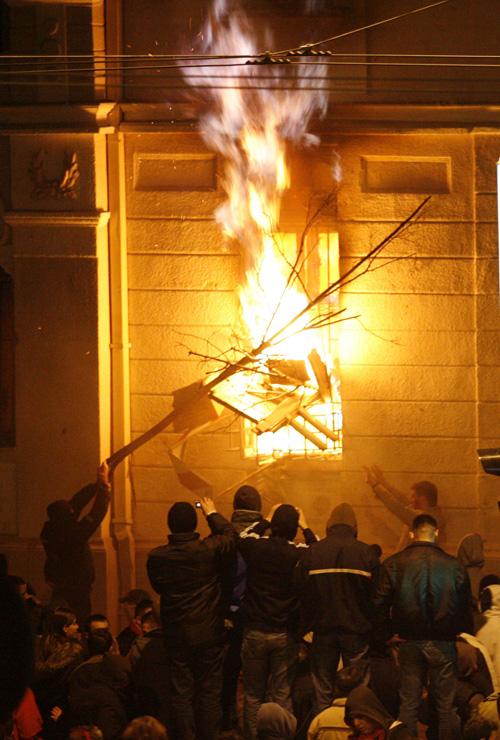Serb protesters break into U.S. Embassy in Belgrade
The U.S. embassy in Belgrade burns after masked attackers broke into the building and set an office on fire at the end of a massive protest against Western-backed Kosovo independence, in the Serbian capital, Thursday, Feb. 21, 2008. More than 150,000 Serb The Associated Press
Feb 22, 2008
Last updated on May 12, 2016 at 09:59 p.m.
BELGRADE, Serbia – Serb rioters broke into the U.S. Embassy and set fire to an office Thursday, and police clashed with protesters outside after a large demonstration against Kosovo’s declaration of independence.
The embassy said a charred body was found in the embassy after the attack. “It was found at the part of the building set on fire by the protesters,” embassy spokeswoman Rian Harris said. She said all embassy staffers were accounted for; Belgrade’s Pink TV said the body appeared to be that of a rioter.
Masked attackers broke into the U.S. compound, which was closed at the time, just after 7 p.m. and tried to throw furniture from an office. They set fire to the office and flames shot up the side of the building.
It took police about 45 minutes to appear at the scene, and firefighters arrived about the same time and put out the blaze. Police secured the U.S. Embassy and surrounding area, blocking off all access.
Get The Daily Illini in your inbox!
The U.S. Ambassador to the United Nations, Zalmay Khalilzad, said he was “outraged” by the attack and would ask the U.N. Security Council to issue a unanimous statement “expressing the council’s outrage, condemning the attack, and also reminding the Serb government of its responsibility to protect diplomatic facilities.”
Serbia’s President Boris Tadic, on an official visit to Romania, appealed for calm and urged the protesters to stop the attacks and move away from the streets. Tadic said that violence was “damaging” Serbia’s efforts to defend Kosovo, which declared its independence from Belgrade on Sunday.
More than a dozen nations have recognized Kosovo’s declaration of independence, including the United States, Britain, France and Germany. But the declaration by Kosovo’s ethnic Albanian leadership has been rejected by Serbia’s government and the ethnic Serbians who populate northern Kosovo.
For several days, Kosovo’s Serbs have shown their anger by destroying U.N. and NATO property, setting off small bombs and staging noisy rallies.
On Thursday, the neighboring Croatian Embassy also was targeted by the same group of protesters at the U.S. Embassy, and smaller groups attacked police posts outside the Turkish and British embassies in another part of the city but were beaten back.
Elite police paramilitaries drove armored jeeps down the street outside the U.S. Embassy and fired dozens of tear gas canisters to clear crowds. The protesters fled into side streets where they continued clashing with the police.
Groups also broke into a McDonald’s restaurant and demolished the interior. A number of other shops were also ransacked and people were seen carrying off running shoes, track suits and other sporting goods from a department store.
Doctors at Belgrade’s emergency clinic reported treating more than 30 injured, half of whom were policemen. All were lightly injured, said Dusan Jovanovic, deputy chief of the clinic, adding that most of the injured protesters were “extremely drunk.”
In Washington, State Department spokesman Sean McCormack said the U.S. ambassador to Serbia was at his home and in contact with U.S. officials. Security officials and Marine guards were in a different part of the compound, but nobody was inside the embassy building, he said.
“We want to strongly urge them, and we are in contact with them, to make sure that they devote the assets to deal with this situation,” McCormack told reporters, referring to the Serbian government.
Serbia has “a responsibility now to devote the adequate resources to ensure that that facility is protected,” he said.
Kosovo, which is 90 percent ethnic Albanian, has not been under Belgrade’s control since 1999, when NATO launched airstrikes to halt a Serbian crackdown on ethnic Albanian separatists. A U.N. mission has governed Kosovo since, with more than 16,000 NATO troops and KFOR, a multiethnic force, policing the province.
Associated Press Writer Edith M. Lederer at the United Nations contributed to this report.






